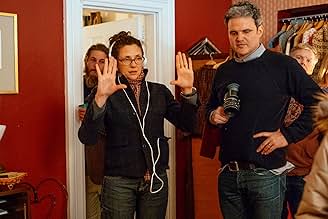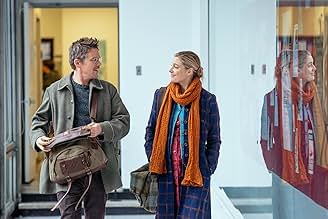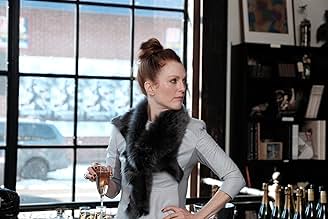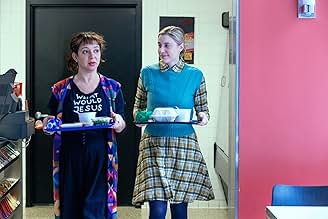IMDb रेटिंग
6.2/10
19 हज़ार
आपकी रेटिंग
मैगी एक बच्चा पैदा करना चाहती है, उसे अपने दम पर बड़ा करना चाहती है, लेकिन जब वह एक विवाहित आदमी जॉन के साथ रूमानी रूप से जुड़ जाती है, तो चीजें जटिल हो जाती हैं और मैगी की योजनाओं का सारा स... सभी पढ़ेंमैगी एक बच्चा पैदा करना चाहती है, उसे अपने दम पर बड़ा करना चाहती है, लेकिन जब वह एक विवाहित आदमी जॉन के साथ रूमानी रूप से जुड़ जाती है, तो चीजें जटिल हो जाती हैं और मैगी की योजनाओं का सारा संतुलन ढह सकता है.मैगी एक बच्चा पैदा करना चाहती है, उसे अपने दम पर बड़ा करना चाहती है, लेकिन जब वह एक विवाहित आदमी जॉन के साथ रूमानी रूप से जुड़ जाती है, तो चीजें जटिल हो जाती हैं और मैगी की योजनाओं का सारा संतुलन ढह सकता है.
- पुरस्कार
- 1 जीत और कुल 9 नामांकन
फ़ीचर्ड समीक्षाएं
Woody Allen by way of Noah Baumbach is as close as I can come to give you an idea of how amusing, smart, and awkward Rebecca Miller's Maggie's Plan is. But, then, the adjectives as well describe indie-fav Greta Gerwig playing Maggie, whose plan to send her husband back to his ex wife reveals the layers that make Maggie one of the most complex romantic heroines in film.
Having fallen in love with hot "ficto-critical anthropologist" John (Ethan Hawke) at The New School, where she works as a career counselor for grad students, Maggie in her quietly innocent but manipulative way has a child with him after his divorce and their marriage. One of the comedic elements is her previous plan to have an artificial insemination from hippy pickle entrepreneur Guy (Travis Fimmel). She has no need to produce the baby in a normal way, an eccentricity never explained but for me felt to be another facet of her quirky and honest personality.
Although you can see the goofy and formulaic elements, underneath is Maggie's genuine wish to have a normal love, a situation not really meant for her given her wacky judgment and clueless orientation. Throughout the wryly wacky plot are numerous elements of truth in modern culture: having a child purposely without father involved; career taking precedence over family (Julienne Moore as high-powered ex-wife academic); step kids as complicating elements; and so on.
Writer/director Miller is deft at playing the elements off each other to make it feel as if all of this confusion is just part of a larger plan. Maggie, as a self-confessed meddler, goes through a labor-intensive series of challenges that go beyond the clichés of the romantic comedy formula. Although the accumulation of challenges may seem too many, each one resonates with a human predicament common to us all.
It's romantic comedy with brains and heart. So human.
Having fallen in love with hot "ficto-critical anthropologist" John (Ethan Hawke) at The New School, where she works as a career counselor for grad students, Maggie in her quietly innocent but manipulative way has a child with him after his divorce and their marriage. One of the comedic elements is her previous plan to have an artificial insemination from hippy pickle entrepreneur Guy (Travis Fimmel). She has no need to produce the baby in a normal way, an eccentricity never explained but for me felt to be another facet of her quirky and honest personality.
Although you can see the goofy and formulaic elements, underneath is Maggie's genuine wish to have a normal love, a situation not really meant for her given her wacky judgment and clueless orientation. Throughout the wryly wacky plot are numerous elements of truth in modern culture: having a child purposely without father involved; career taking precedence over family (Julienne Moore as high-powered ex-wife academic); step kids as complicating elements; and so on.
Writer/director Miller is deft at playing the elements off each other to make it feel as if all of this confusion is just part of a larger plan. Maggie, as a self-confessed meddler, goes through a labor-intensive series of challenges that go beyond the clichés of the romantic comedy formula. Although the accumulation of challenges may seem too many, each one resonates with a human predicament common to us all.
It's romantic comedy with brains and heart. So human.
Among many other things, the best dialogue-driven character studies can create a sense of real connectedness between the viewer and the people depicted on screen. If well narrated, those films can serve as a mirror to your own experiences or open up new perspectives on life in general. Directors that have managed to achieve this in the past like (the early) Woody Allen or Noah Baumbach are also often named as references when it comes to Rebecca Miller's latest film Maggie's Plan.
Indeed, when you saw the trailer, you got the feeling a new Baumbach is coming up: set in New York, starring Greta Gerwig playing a Gerta Gerwig-character and a plot revolving around existential questions of a group of well-educated, slightly quirky people. I love all of these elements and mixed with a cast including Ethan Hawke and Julianne Moore I was very excited to see this film.
However, the aspects of indie films I mentioned above which I deem so important are all missing here. Once you have accepted the awkward premise (which is far-fetched enough) that the protagonist Maggie (Greta Gerwig) desperately wants to reunite her husband John (Ethan Hawke) with his ex-wife (Julianne Moore), the film misses all its chances to handle the characters' issues with precision and depth. This starts with the poor writing which does include some amusing lines and interesting insights (my favourite being John's take on unborn babies) but still fails to make the characters' motivations and intentions appear reasonable. Despite the fact that they are always quite short, films like The Squid and the Whale never feel rushed. In Maggie's Plan we see many rapid developments and turns in attitude that are often hard to make sense of.
Apart from problems in the script, the film suffers from the way it is directed. One major element is a trope that is more than predominant in recent cinema which comes down to a formula many directors seem to have internalised deeply: Shaky camera = Authenticity. In order to immerse the viewer within a scene, many films employ this technique, however in many cases in such a exaggerated manner that it becomes a parody of itself (Exhibit A: The Hunger Games; Counterexample (how it should be done): Children of Men). The same is the case in Maggie's Plan. It is the film's ambition to live up to its predecessors by offering a perspective that feels true to life. But unnecessary zoom-ins, shakes and pans occasionally disrupt the viewing experience. Films that rely on quiet, emotional scenes like this one benefit from a rather still, observant depiction, so that the viewer likely forgets that there is a camera.
Having said all this, I still consider Maggie's Plan an average film which is mostly due to the cast. The actors do what they can to give the weird script at least some emotional depth (even though I add Julianne Moore's choice of accent to the list of things that bewildered me). My harsh critique is probably due to high expectations. But I just didn't assume they were that high, as I would have been happy, if some main elements that separate these kinds of films from major blockbusters had been displayed.
My main concern with this review is to counter the many voices comparing this film to indie masterpieces like Frances Ha or Annie Hall. Maggie's Plan is not even close to being in the same league. To quote Pulp Fiction, it is not even the same sport.
Indeed, when you saw the trailer, you got the feeling a new Baumbach is coming up: set in New York, starring Greta Gerwig playing a Gerta Gerwig-character and a plot revolving around existential questions of a group of well-educated, slightly quirky people. I love all of these elements and mixed with a cast including Ethan Hawke and Julianne Moore I was very excited to see this film.
However, the aspects of indie films I mentioned above which I deem so important are all missing here. Once you have accepted the awkward premise (which is far-fetched enough) that the protagonist Maggie (Greta Gerwig) desperately wants to reunite her husband John (Ethan Hawke) with his ex-wife (Julianne Moore), the film misses all its chances to handle the characters' issues with precision and depth. This starts with the poor writing which does include some amusing lines and interesting insights (my favourite being John's take on unborn babies) but still fails to make the characters' motivations and intentions appear reasonable. Despite the fact that they are always quite short, films like The Squid and the Whale never feel rushed. In Maggie's Plan we see many rapid developments and turns in attitude that are often hard to make sense of.
Apart from problems in the script, the film suffers from the way it is directed. One major element is a trope that is more than predominant in recent cinema which comes down to a formula many directors seem to have internalised deeply: Shaky camera = Authenticity. In order to immerse the viewer within a scene, many films employ this technique, however in many cases in such a exaggerated manner that it becomes a parody of itself (Exhibit A: The Hunger Games; Counterexample (how it should be done): Children of Men). The same is the case in Maggie's Plan. It is the film's ambition to live up to its predecessors by offering a perspective that feels true to life. But unnecessary zoom-ins, shakes and pans occasionally disrupt the viewing experience. Films that rely on quiet, emotional scenes like this one benefit from a rather still, observant depiction, so that the viewer likely forgets that there is a camera.
Having said all this, I still consider Maggie's Plan an average film which is mostly due to the cast. The actors do what they can to give the weird script at least some emotional depth (even though I add Julianne Moore's choice of accent to the list of things that bewildered me). My harsh critique is probably due to high expectations. But I just didn't assume they were that high, as I would have been happy, if some main elements that separate these kinds of films from major blockbusters had been displayed.
My main concern with this review is to counter the many voices comparing this film to indie masterpieces like Frances Ha or Annie Hall. Maggie's Plan is not even close to being in the same league. To quote Pulp Fiction, it is not even the same sport.
Here New York singleton Maggie is played by Greta Gerwig, an actress who can be funny and serious, pretty and plain, switching from one to the other in seconds. Her original plan is to have a baby through a sperm donor, although later in the movie she conceives (sorry for the pun) another plan involving her husband, self-absorbed academic John (Ethan Hawke in a classic verbose role), and his ex-wife, the Danish ambitious academic Georgette (the ever-able Juliette Moore). The moral of the story is that our plans often don't work out as we expect and, even when they do, it might not actually be because of us.
I think this is an under-rated movie with interesting characters and real charm. There are no action sequences or dramatic conflicts, but it is quietly engaging and insightful. Rebecaa Miller wrote and directed it from the novel by Karen Rinaldi and the most intriguing relationship is between Maggie and Georgette, so some will be tempted to dismiss it as a woman's film, but I recommend it to anyone who wants something a bit more lifelike and thoughtful compared to the more traditional rom-com.
I think this is an under-rated movie with interesting characters and real charm. There are no action sequences or dramatic conflicts, but it is quietly engaging and insightful. Rebecaa Miller wrote and directed it from the novel by Karen Rinaldi and the most intriguing relationship is between Maggie and Georgette, so some will be tempted to dismiss it as a woman's film, but I recommend it to anyone who wants something a bit more lifelike and thoughtful compared to the more traditional rom-com.
I think I got tricked into watching this movie by looking at the cast. There are undeniably good actors and actresses in this movie but that doesn't mean a certainty for success. On the contrary, it turned out to be a borefest. I couldn't wait for the end credits to appear. As for the comedy level I had two or three small grins, so nothing that will stay memorable for the rest of my life, like some other good comedies sometimes do. If you like endless debating about something dramatic like couples arguing about nothing then you might enjoy this. I can't believe I wasted my time with this one as it was clearly going to be really boring after only five minutes.
Greetings again from the darkness. A significant portion of Woody Allen's film career has been projects that seem designed to appeal to (sometimes only) the New York intellectual sub-culture. You know the type
those who thrive on talking (incessantly) about all the things they know, often without really accomplishing anything themselves. They are the kind of people we usually laugh at, rather than with. Filmmaker Rebecca Miller appears ready to accept the passing of the Woody Allen baton, and at a minimum, her latest is heavily influenced by his comedic-brain food.
Ms. Miller casts perfectly for her first film in six plus years (The Secret Life of Pippa Lee, 2009). Greta Gerwig plays Maggie, whose ever-evolving "plan" is both the title and focus of the film. Ethan Hawke plays John, the middle-aged crisis guy who wants desperately to be showered with attention. Julianne Moore plays Georgette, John's slightly odd and brilliant wife, and mother to their two kids. Other key players include Travis Fimmel as Guy, a pickle entrepreneur and the center piece to Maggie's master plan; Bill Hader and Maya Rudolph as friends and confidants of Maggie; and Wallace Shawn, always a treat on screen.
The story starts out pretty simple, and then gets complicated, and then kind of loses focus before ending just right. Perpetually whining Maggie has admittedly given up on ever finding the kind of true love that results in a happy family. Because of this, she has recruited former schoolmate and math whiz and pickle dude Guy to supply the missing link for her artificial insemination. This leads to one of film's rare cheap laughs and one that not even the quirky Gerwig can pull off. A payroll mishap brings Maggie and aspiring novelist John (a 'ficto-critical anthropologist' by trade) together, and her willingness to read his writing and offer some support, is all it takes to finish off John's slowly disintegrating marriage to Georgette (Ms. Moore dusting off the Euro accent she used in The Big Lebowski).
Writer/director Miller is the daughter of famed playwright Arthur Miller, who wrote Death of a Salesman and was once married to Marilyn Monroe (after Joe DiMaggio). She also directed The Ballad of Jack and Rose, which starred her husband, Oscar winner Daniel Day-Lewis. Much of her latest film feels contrived and over-written as if every scene carries the burden of generating a laugh out loud moment. It shouldn't be too surprising that the ultra talented Julianne Moore creates the most interesting character, though unfortunately, she has the least amount of screen time among the three leads. It's good for a few laughs, as well as some cringing and an ending that actually works.
Ms. Miller casts perfectly for her first film in six plus years (The Secret Life of Pippa Lee, 2009). Greta Gerwig plays Maggie, whose ever-evolving "plan" is both the title and focus of the film. Ethan Hawke plays John, the middle-aged crisis guy who wants desperately to be showered with attention. Julianne Moore plays Georgette, John's slightly odd and brilliant wife, and mother to their two kids. Other key players include Travis Fimmel as Guy, a pickle entrepreneur and the center piece to Maggie's master plan; Bill Hader and Maya Rudolph as friends and confidants of Maggie; and Wallace Shawn, always a treat on screen.
The story starts out pretty simple, and then gets complicated, and then kind of loses focus before ending just right. Perpetually whining Maggie has admittedly given up on ever finding the kind of true love that results in a happy family. Because of this, she has recruited former schoolmate and math whiz and pickle dude Guy to supply the missing link for her artificial insemination. This leads to one of film's rare cheap laughs and one that not even the quirky Gerwig can pull off. A payroll mishap brings Maggie and aspiring novelist John (a 'ficto-critical anthropologist' by trade) together, and her willingness to read his writing and offer some support, is all it takes to finish off John's slowly disintegrating marriage to Georgette (Ms. Moore dusting off the Euro accent she used in The Big Lebowski).
Writer/director Miller is the daughter of famed playwright Arthur Miller, who wrote Death of a Salesman and was once married to Marilyn Monroe (after Joe DiMaggio). She also directed The Ballad of Jack and Rose, which starred her husband, Oscar winner Daniel Day-Lewis. Much of her latest film feels contrived and over-written as if every scene carries the burden of generating a laugh out loud moment. It shouldn't be too surprising that the ultra talented Julianne Moore creates the most interesting character, though unfortunately, she has the least amount of screen time among the three leads. It's good for a few laughs, as well as some cringing and an ending that actually works.
क्या आपको पता है
- ट्रिवियाThe language that Julianne Moore and her kids speak is Danish.
- साउंडट्रैकMusical Communion
Written by Don Drummond & Arthur Stanley Reid
Performed by Baba Brooks
Courtesy of Push Music / Treasure Isle
Courtesy of Sanctuary Records Group Ltd., a BMG Company
All rights administered by BMG Rights Management (US) LLC
टॉप पसंद
रेटिंग देने के लिए साइन-इन करें और वैयक्तिकृत सुझावों के लिए वॉचलिस्ट करें
- How long is Maggie's Plan?Alexa द्वारा संचालित
विवरण
- रिलीज़ की तारीख़
- कंट्री ऑफ़ ओरिजिन
- आधिकारिक साइटें
- भाषाएं
- इस रूप में भी जाना जाता है
- El plan de Maggie
- फ़िल्माने की जगहें
- 45 Broadway, ब्रुकलीन, न्यूयॉर्क शहर, न्यूयॉर्क, संयुक्त राज्य अमेरिका(Maggie's apartment)
- उत्पादन कंपनियां
- IMDbPro पर और कंपनी क्रेडिट देखें
बॉक्स ऑफ़िस
- US और कनाडा में सकल
- $33,51,735
- US और कनाडा में पहले सप्ताह में कुल कमाई
- $63,308
- 22 मई 2016
- दुनिया भर में सकल
- $58,83,891
- चलने की अवधि1 घंटा 38 मिनट
- रंग
- ध्वनि मिश्रण
- पक्ष अनुपात
- 1.85 : 1
इस पेज में योगदान दें
किसी बदलाव का सुझाव दें या अनुपलब्ध कॉन्टेंट जोड़ें







































